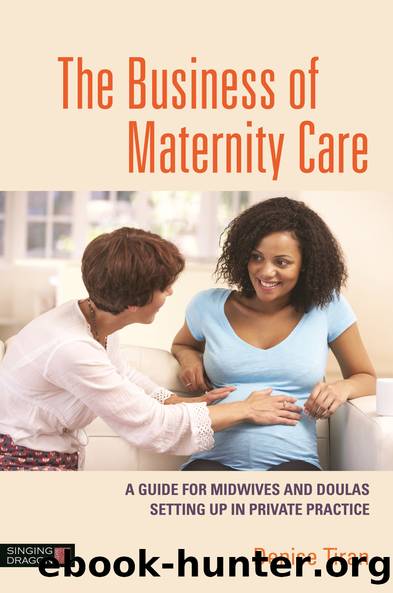The Business of Maternity Care by Denise Tiran;

Author:Denise Tiran; [Неизв.]
Language: eng
Format: epub
ISBN: 9780857013859
Publisher: Jessica Kingsley Publishers
Published: 2018-11-01T20:00:00+00:00
Conflicts of interest
One of the most difficult issues for midwives and doulas to deal with is that of conflicts of interest. This may be a conflict between your clinical and business roles, a difference between your midwifery/doula role and that of the services you provide in a self-employed capacity, or a conflict between being an NHS employee and also working in private practice.
A joint statement on this latter issue was published in February 2017 by NHS England,3 which set out certain principles and rules for identifying, avoiding, minimising and managing conflicts of interest. This was followed in August 2017 by a statement from the NMC4 that was specific to NMC registrants, and the principles refer to all four countries of the UK. Other Royal Colleges have also published statements relevant to their own registrants. The NHS England statement refers only to NHS employees, so if you do not work within the NHS, you are not bound by its requirements, although the principles pertain, in general terms, to all private practitioners, particularly those with a statutory registration such as midwives.
It was acknowledged by all parties involved in devising the joint statement that conflicts can arise in situations where a practitionerâs judgement may be influenced by a personal, financial or other interest, particularly when it involves people working in complex systems such as the NHS. âInterestsâ may be defined as directly financial or as personal or professional non-financial benefits (such as promises of career promotion) or indirect benefits. The joint statement emphasised that the NHS commitments of all its staff must take precedence over private practice. One suggestion was made that doctors, dentists and others should be required to publish details of their income from work undertaken outside the NHS. The Royal College of Surgeons (2016) opposed this, claiming that is it not relevant and that a requirement to do so implies that the NHS âdoes not trustâ its staff.5 At the time of writing this suggestion has, thankfully, not been implemented.
You must declare any existing work in which you engage outside your NHS employment, and steps may be considered by managers in order to reduce the risk of conflict. You may be required to seek approval prior to working in private practice, and must declare the nature, dates and duration of your outside work, once commenced. If you believe that a conflict of interest has arisen or is likely to arise, you should formally notify your manager, in writing. You are not, in any circumstances, permitted to promote your private practice whilst engaged in NHS activities, nor should you ask other staff to initiate such discussions on your behalf. You are also required to declare non-clinical roles you may hold outside your NHS employment, such as consultancy work or acting as a charity trustee or school governor. If you are paid to present a paper at a conference you must now also declare this, even if you choose to donate your fee to a charitable organisation.
Many of the issues raised by
Download
This site does not store any files on its server. We only index and link to content provided by other sites. Please contact the content providers to delete copyright contents if any and email us, we'll remove relevant links or contents immediately.
Nice Girls Don't Get the Corner Office by Lois P. Frankel(2594)
Brotopia by Emily Chang(2592)
Lean In by Sheryl Sandberg(1191)
Resilience by Lisa Lisson(1189)
Invested by Danielle Town(1133)
Lean In: Women, Work, and the Will to Lead by Sheryl Sandberg(1105)
In the Darkroom by Susan Faludi(1093)
I Shouldn't Be Telling You This: Success Secrets Every Gutsy Girl Should Know by Kate White(1083)
Girl, Stop Apologizing: A Shame-Free Plan for Embracing and Achieving Your Goals by Rachel Hollis(984)
Brave, Not Perfect by Reshma Saujani(982)
Women Who Work by Ivanka Trump(971)
Boss Bitch by Nicole Lapin(963)
Sun Tzu's Art of War for Women by Catherine Huang(955)
Girl Decoded by Rana el Kaliouby & Carol Colman(886)
Fifty Million Rising by Saadia Zahidi(869)
The Sense of an Ending by Julian Barnes(859)
Woman to Woman by Kim Chamberlain(839)
Estate Sales Made Easy by Victoria Gray(809)
Hiding in the Bathroom by Morra Aarons-Mele(802)
